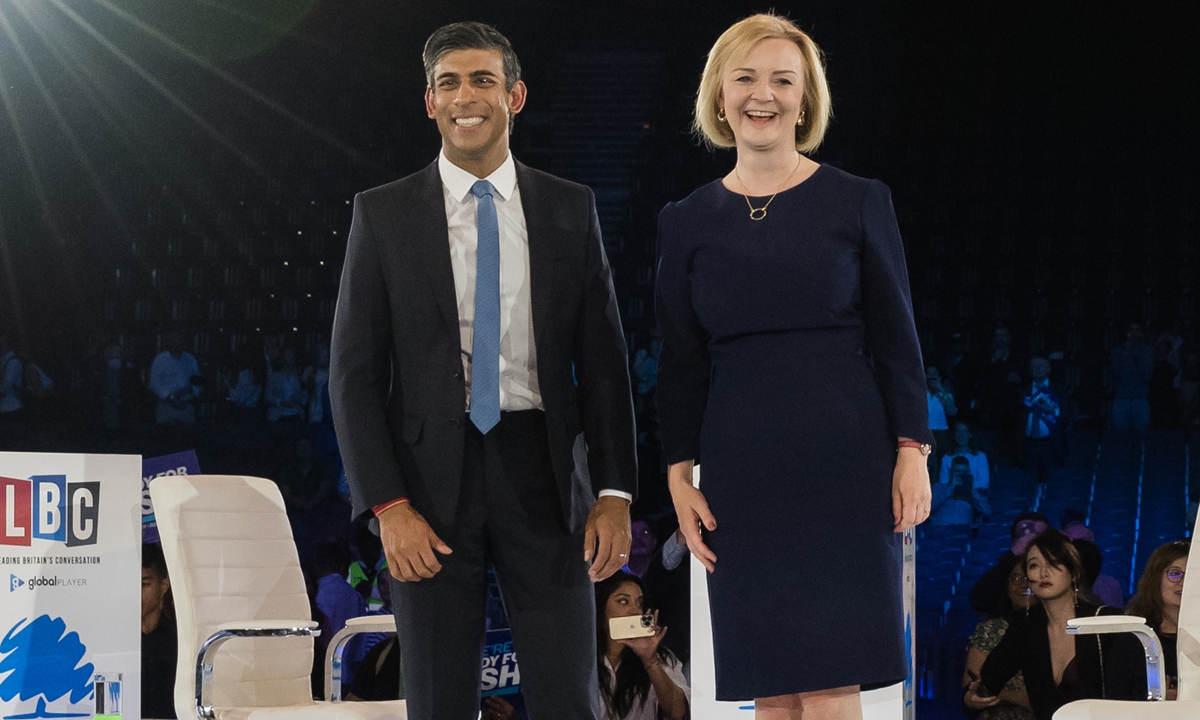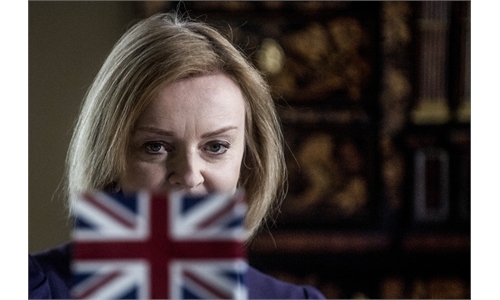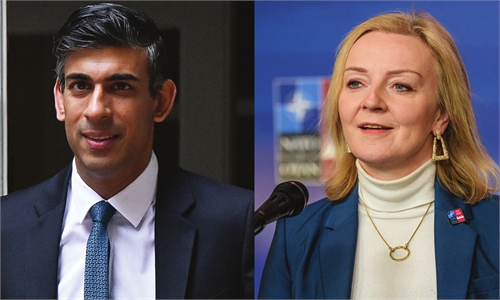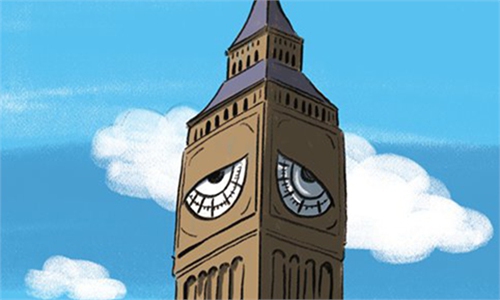UK to welcome new PM, urged to be ‘pragmatic’ on China-UK ties
Cooperation with Beijing offers London one way out of current predicament: experts

Rishi Sunak (left) and Liz Truss take part in the final Conservative leadership election hustings in London, UK, on August 31, 2022. Photo: VCG
As the tight race for new UK prime minister comes to an end, Chinese observers predicted that there might be more turbulence ahead for China-UK relations, warning the future UK leader to hold a pragmatic approach in cooperating with China and stop following through on the hawkish language they uttered during the leadership race, as the winner must tackle the most challenging problems facing a British prime minister in generations.
Practical cooperation with China may offer a way out, they said.
Britain will get a new prime minister, with either Foreign Secretary Liz Truss or former finance minister Rishi Sunak being announced on Monday as the next leader of the governing Conservative Party, and the next prime minister.
On Tuesday, in a break with tradition, the appointment of the new prime minister will take place at Balmoral Castle in Scotland, where Queen Elizabeth spends her summers, rather than at Buckingham Palace in London, according to Reuters report.
Truss and Sunak have been traveling across the country in a series of hustings since early August, making their case to around 160,000 members of the Tory party, who have been voting for a new leader.
Chinese experts who are closely watching this long and white-hot race believe that no matter who comes out victorious, the foremost important task will be to fix the potholes left by ousted current prime minister Boris Johnson, including saving the collapsing economy, addressing the energy prices crisis and other wage disputes.
"The new prime minister will go through a short period of finding a balance on ties with China, since cooperation with China, especially after Brexit, benefited the UK significantly, and it will help the UK to address its current economic predicament," Cui Hongjian, director of the Department of European Studies at the China Institute of International Studies, told the Global Times.
Experts believe due to the Russia-Ukraine crisis and other issues, the UK is facing most challenging economic problems in generations, with household energy bills recently shooting up by 80 percent.
Goldman Sachs warned that inflation could reach 22 percent early next year, and the Bank of England forecast a lengthy recession, according to CNBC.
In order to address those issues, Truss has campaigned to slash taxes and prioritize economic growth above all else, while her opponent Sunak has proposed cutting value added tax on energy bills.
Meanwhile, Chinese experts noticed that both candidates have fired hawkish signals against China during their campaign. For example, it is reported that Truss is set to declare China as a "threat" to national security if she becomes prime minister. Similarly, Sunak said in July that China is the "largest threat" to the UK and the world's security and prosperity this century.
In response to Truss's threats, Zhao Lijian, spokesperson of China's Ministry of Foreign Affairs, said in late August that hyping the so-called China threat is irresponsible, and will not solve the UK's current problems.
"Politicians always choose belligerent words during election campaign. When he or she assumes the leadership, they are expected to be more pragmatic and flexible in solving the real problems. The UK is a case in point, as London is facing vexing economic problems, cooperation with China can't just be cast aside," a Beijing-based expert specializing in diplomacy, told the Global Times.
The expert warned that future UK politicians should be cautious, as hawkish comments could easily unstitch the fabric of bilateral ties and harm the cooperative atmosphere.
China is the UK's third-biggest trade partner. Britain relied on China more than ever before in 2021 in terms of trade, as Chinese goods accounted for a seventh of all British imports, The Telegraph reported in February.
"Dependency on China has steadily grown over the past decade and reached a record high of 14 percent of total imports in 2021," Ana Boata, an economist at credit insurance company Euler Hermes, was quoted by the British newspaper as saying.
Yet experts also warned that there will be more turbulence in future Beijing-London ties, as the Conservative Party will lean closer to the US on diplomatic, political and national security fronts.
However, Wang Yiwei, director of the Institute of International Affairs at the Renmin University of China believes the relationship between London and Washington cannot be simply concluded as that of a "follower."
He said the UK is still in a "chaotic transitional period of post-Brexit," and the country, a fading superpower that used to be dubbed the "Empire on which the sun never sets" is still struggling to find its place in the new international order. "That is why British politicians are making high-profile shows on the Russia-Ukraine crisis, taking part in Indo-Pacific issues and even meddling in the Taiwan question," Wang said.
Truss, for instance, shows little reverence for the "special relationship" between the UK and the US. "It's special, but not exclusive," she said at the Tory party conference last year, noting that Britain has other important allies like Australia, India and European countries, notably the Baltic States, The New York Times reported in March.
Chinese experts believe that the UK's time-honored pragmatic diplomacy will enable the country to continue a strong momentum of cooperation with China, while standing with the US to attack China on issues such as human rights, diplomacy and national security.
"I don't believe the future UK prime minister will have a one-track mind that is determined to bungle China-UK ties deliberately; London will still be open for cooperation if it sees interest in it. As for China, we should deal with UK's political reshuffle according to our interests and pace, continue to expand common interests, and push for bilateral ties to not go to extremes," said the Beijing-based expert.



